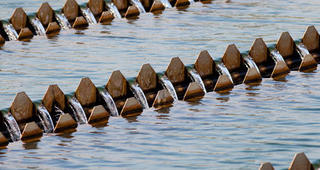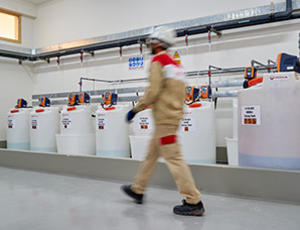Veolia Water Technologies helps you to increase the productivity of your plant and meet tightening environmental standards, thanks to high-quality water treatment solutions for power plants.
Water and regulations: challenges faced by the power industry

Reliable water treatment systems adapted to regional constraints

Stringent environmental regulations.

High demand for power generation needs.

Facing growing populations and emerging markets.

Increasing its efficiency while regulating costs.
How Veolia is committed to helping its power generation clients
Veolia Water Technologies specializes in water and wastewater treatment solutions for various types of power stations: conventional power stations, fossil fuel or solar plants. Our packaged and tailor-made water solutions cover the complete water and wastewater cycle.
We have significantly improved the performance of many power stations, allowing them to meet regulatory challenges while saving on capital expenditure. We also help operators who are exploring efficiency options for new, smaller-scale plants, or who want to draw on the best water technology for natural gas or other emerging energy sources.

We can provide you with a tailor-made water management system focusing on technical performance, compliance with process and environmental requirements, and long-term cost effectiveness. Our water treatment systems fulfil the most demanding reliability and quality requirements essential to energy production.
Our flexible contracting arrangements allow us to share your risks, lower your costs, and guarantee results.
Adaptable solutions for all power generation players
For optimum energy efficiency, water treatment must comply with precise specifications from pretreatment right through to recycling.
Desalination of boiler feed water
- Pretreatment by conventional filtration and/or membrane processes.
- Desalination through classic ion exchange technology.
- Reverse osmosis and mixed bed filtration.
- Electrodeionization (CEDI).
- Degassing (membrane degassing, Riesler, vacuum degassing).
- Polishing treatment.
Condensate cleaning
- Oil separation (if necessary).
- Cartridge filters (backwashable, not backwashable).
- Ion exchangers (with internal or external regeneration via SeparIX™).
- Chemical conditioning.
Treatment of wastewater from flue gas cleaning
Wastewater from flue gas desulphurisation (FGD) must be treated before being discharged. The main tasks in the treatment of FGD wastewater are:
- Desaturation of gypsum.
- Solids reduction.
- Heavy metal removal.
We offer conventional one or two-stage precipitation plants for the treatment of FGD wastewater as well as innovative solutions for reducing sludge and wastewater quantities.
Depending on the location of the plant and the required discharge quality, further process steps are necessary for treating FGD wastewater:
- Further reduction of solids (filter).
- Further reduction of special substances (nitrates).
Discover our water treatment technologies for the power industry
Our wide range of water purification technologies for the power generation industry can help you to:
- Improve and maintain the health of your boiler feed water treatment system.
- Reduce boiler energy consumption.
- Reduce build-up of scale and corrosion in your boiler.
- Ensure continuity of make-up water supply to your boilers during maintenance.
- Treat or minimize wastewater.
- Secure a water supply, which may be jeopardized because of water restrictions linked to the drought or excess water conditions.
- Ensure the security and safety of the water process at power stations.
- Prevent legionella and manage health risks through preventative solutions and complete treatment programs to secure water treatment plants and cooling towers.
- Implement clean technologies, continuous improvement policies and sustainable development to protect the environment.
Technologies - Power
Would you like more information about our technologies for the power industry?
More services for our power clients
FAQ about water solutions for power industries
Why is makeup water required in a cooling tower?
Cooling tower makeup water is used to replace water losses in a cooling tower system. Water loss occurs due to evaporation, droplet carryover and blowdown to reduce particles (TSS) and dissolved solids (TDS).
Which process is required for cooling tower water treatment ?
Depending on the type of cooling tower different target water qualities need to be achieved. The appropriate process also needs to be designed based on the available raw water quality. In general, flocculation and sedimentation are used to reduce the particles (TSS) and partly organics (NOM) but also for hardness removal. If necessary, dissolved solids (TDS) can be removed by ion exchange or reverse osmosis.
Why is condensate polishing needed in a water/steam cycle?
Polishing condensate prevents the concentration of soluble impurities, which could corrode internals and cause damage to boilers and turbines. Corrosion, in turn, could cause insoluble impurities such as copper, iron and silica to re-circulate in the stream. If left unchecked, these impurities could eventually result in plant failure. Condensate polishing is especially crucial in supercritical or ultra-supercritical boilers, where all impurities from the boiler directly enter the turbine.
Why is boiler feed water treatment needed?
Depending on the operating pressure of the boiler, the water chemistry can cause precipitation of hardness or other substances which are insoluble at the conditions in the boiler. In order to prevent that, salts need to be removed from the water by a boiler feed water treatment system which is fed for example by well water, drinking water or surface water. Depending on the raw water source, particles need to be removed by filtration or sedimentation followed by an ion exchange or reverse osmosis system.








